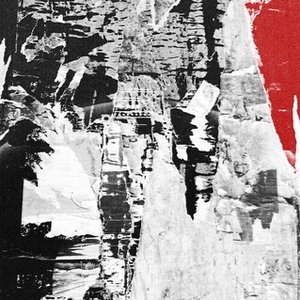The Soft Moon - Deeper

Replicating the past is a dangerous thing, often leading to a descent into a tired pastiche of nostalgia for that which never was, a strange simulacrum. The important (and tricky) thing to do, here, is to create something that references and echoes the past, yet feels somehow timeless or out-of-time, to reference others but do so through the filter of your own voice.
The Soft Moon started as a one-man post-punk revival band (post-post-punk?) in 2009, and pulled off that basic value proposition fairly well, with two albums of well-executed, fuzz-washed, takes on the classic post-punk sound developed in the 70's and 80's. Despite a lingering undercurrent of experimentation, these albums often felt restrained, caged-in, the wandering early strokes of a voice that either was too caught up in nostalgia or too unconfident of its own abilities to let itself loose from underneath layers of reverb, fuzz, and post-punk trope purism.
Deeper is the freeing of that voice, a hard-won success in echoing the past without mimicking it, creating something out-of-time, new but old.
The fuzzy, synths-recorded-through-tape-deck-in-a-garage sound has been lifted greatly -- but not too much -- allowing the album to still retain a level of grit that prevents it from feeling overproduced, and industrial and noise experimentalism has been brought to the surface.
It opens with a siren: not a literal one, but a slowly pulsing synth line that oozes with dread and anticipation. Chopped-up whispers float over top, reduced from coherency into a kind of mystical babel, as the noise of this 40-second prelude builds into layers of interlocking cacophony.
Then the album really begins. A heavy, droning synth in a low register. A kick with the punch of a mechanical heartbeat, a stuttered, whispered vocal recalling the better parts of the Nine Inch Nails catalogue. A pulse of noise like steam from a mechanical heart, more building dread as the cacophony builds, echoing the album's opener as things descend into chopped up, noisy (but coherent) madness.
Suddenly, it cuts out, and now we're channeling Sisters of Mercy, or early The Cure, a driving, claustrophobic gothic/post-punk anthem with expressive vocals that are almost the polar opposite of the caged, whispered refrain of before, vibrant and on the verge of tears, speaking with urgency, but with a soft touch.
Hearing the vocals of The Soft Moon open up into a more emotive territory is a true treat, and luckily continues to be explored throughout the album, moving with a dread-inducing pace throughout. The chugging baselines and urgent chant on Wasting becomes subsumed with layers of claustrophobic noise and reverb. The machine-gun drums and synths of Wrong pulse with cyberpunk fury.
The album unfortunately lags for a bit around track 7, remaining solid but feeling slightly tired, lacking the feeling of fury and urgency present in other tracks. This is likely largely a matter of track placement and pacing, as tracks 7 and 8 seem as though they'd feel more at home near the end of the album, as a coda, a refrain.
Things pick up pretty quickly though -- Without is a simple but divinely executed piano-and-noise ballad that drips existential, post-breakup angst, the feeling of locking yourself in a dark closet and creating a bonfire out of a pile of old photographs and love letters. Deeper is a positively fantastic track, possibly an album highlight, channeling Dead Can Dance with tribal polyrhythms and chants before opening up into a delightfully treated vocal performance, layering monolithic, ground raising synths on top with precision and restraint.
The album closer, Being, is also a highlight. "I can't see my face / I don't how I am", we hear whispered through us through a tape deck, then rewinded, repeated, rewinded, repeated. Then, the music comes in on top of this refrain, post-punk influenced guitar and drums that are standard, but don't sound tired, repeating, refraining, and building before erupting into a volcanic tower of noise, as the whispered refrain from the beginning of the song becomes an anguished, distorted scream on top of growing levels of noise and fury. Halfway through the song, everything else drops out, and all we hear is the chopped, reverb-soaked scream of the man from the tape deck, and then blank noise, an empty signal, television tuned to a dead ghost channel, hairs raising slowly on the back of our neck.
Overall, while the album has a few pacing issues and a couple of tracks that verge on filler material (or B-side material), the album as a whole is a wonderful achievement, oozing with mysticism, angst, and a unique voice learning to set itself free from underneath layers of historical reference, while still wearing its influences on its sleeve. It sounds fuller -- more lush, broad, and refined than the band's previous albums. It's a fantastic leap from previous work, and a highlight in this band's catalogue. Apr 25 2015
The Soft Moon started as a one-man post-punk revival band (post-post-punk?) in 2009, and pulled off that basic value proposition fairly well, with two albums of well-executed, fuzz-washed, takes on the classic post-punk sound developed in the 70's and 80's. Despite a lingering undercurrent of experimentation, these albums often felt restrained, caged-in, the wandering early strokes of a voice that either was too caught up in nostalgia or too unconfident of its own abilities to let itself loose from underneath layers of reverb, fuzz, and post-punk trope purism.
Deeper is the freeing of that voice, a hard-won success in echoing the past without mimicking it, creating something out-of-time, new but old.
The fuzzy, synths-recorded-through-tape-deck-in-a-garage sound has been lifted greatly -- but not too much -- allowing the album to still retain a level of grit that prevents it from feeling overproduced, and industrial and noise experimentalism has been brought to the surface.
It opens with a siren: not a literal one, but a slowly pulsing synth line that oozes with dread and anticipation. Chopped-up whispers float over top, reduced from coherency into a kind of mystical babel, as the noise of this 40-second prelude builds into layers of interlocking cacophony.
Then the album really begins. A heavy, droning synth in a low register. A kick with the punch of a mechanical heartbeat, a stuttered, whispered vocal recalling the better parts of the Nine Inch Nails catalogue. A pulse of noise like steam from a mechanical heart, more building dread as the cacophony builds, echoing the album's opener as things descend into chopped up, noisy (but coherent) madness.
Suddenly, it cuts out, and now we're channeling Sisters of Mercy, or early The Cure, a driving, claustrophobic gothic/post-punk anthem with expressive vocals that are almost the polar opposite of the caged, whispered refrain of before, vibrant and on the verge of tears, speaking with urgency, but with a soft touch.
Hearing the vocals of The Soft Moon open up into a more emotive territory is a true treat, and luckily continues to be explored throughout the album, moving with a dread-inducing pace throughout. The chugging baselines and urgent chant on Wasting becomes subsumed with layers of claustrophobic noise and reverb. The machine-gun drums and synths of Wrong pulse with cyberpunk fury.
The album unfortunately lags for a bit around track 7, remaining solid but feeling slightly tired, lacking the feeling of fury and urgency present in other tracks. This is likely largely a matter of track placement and pacing, as tracks 7 and 8 seem as though they'd feel more at home near the end of the album, as a coda, a refrain.
Things pick up pretty quickly though -- Without is a simple but divinely executed piano-and-noise ballad that drips existential, post-breakup angst, the feeling of locking yourself in a dark closet and creating a bonfire out of a pile of old photographs and love letters. Deeper is a positively fantastic track, possibly an album highlight, channeling Dead Can Dance with tribal polyrhythms and chants before opening up into a delightfully treated vocal performance, layering monolithic, ground raising synths on top with precision and restraint.
The album closer, Being, is also a highlight. "I can't see my face / I don't how I am", we hear whispered through us through a tape deck, then rewinded, repeated, rewinded, repeated. Then, the music comes in on top of this refrain, post-punk influenced guitar and drums that are standard, but don't sound tired, repeating, refraining, and building before erupting into a volcanic tower of noise, as the whispered refrain from the beginning of the song becomes an anguished, distorted scream on top of growing levels of noise and fury. Halfway through the song, everything else drops out, and all we hear is the chopped, reverb-soaked scream of the man from the tape deck, and then blank noise, an empty signal, television tuned to a dead ghost channel, hairs raising slowly on the back of our neck.
Overall, while the album has a few pacing issues and a couple of tracks that verge on filler material (or B-side material), the album as a whole is a wonderful achievement, oozing with mysticism, angst, and a unique voice learning to set itself free from underneath layers of historical reference, while still wearing its influences on its sleeve. It sounds fuller -- more lush, broad, and refined than the band's previous albums. It's a fantastic leap from previous work, and a highlight in this band's catalogue. Apr 25 2015
Share this review
Facebook
Twitter
Google+
Shares
Buy this release
iTunes
The Soft Moon - Criminal Remixed Vol. 1 is available at POPONAUT from 15,95€
Related articles
Kartagon - 'Natural Instincts'
Review, Jan 01 2003
Gomddam Memory - 'One Last Job'
Review, Apr 10 2021
Xanthippe - 'Issue5 / The Love Zombie'
Review, Jan 17 2012
Squaremeter - 'Heliogabal'
Review, Mar 14 2011
Dune - 'Momentous'
Review, Sep 10 2018





